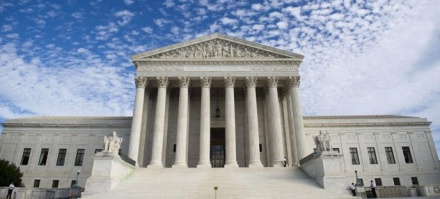
For a printable, bulletin board-ready copy, click here.
On Monday, the Supreme Court of the United States handed down its decision in Harris v. Quinn, a case examining the legality of requiring partial public employees in a bargaining unit to at least pay “fair-share” dues, if not full membership dues. While many legal analysts anticipated a decision that would have decimated public employee unions, Justice Samuel Alito’s opinion is narrow in scope and only impacts the specific employees in question in this case. While the immediate impact of the decision was relatively minor, the legal precedent set has dangerous potential implications for Unions everywhere.
Harris v. Quinn involved home healthcare workers in the state of Illinois who are paid with state Medicaid funds, yet managed and supervised by private contractors. The Service Employees International Union (SEIU) organized the workers back in 2003, bringing nearly doubled wages, increased benefits, and more suitable working conditions in the decade following Union-led collective bargaining.
What made the representation for these workers unique was the two-tiered dues structure available for employees. Employees were offered two options for dues: a choice to be a full-time member, paying membership dues and receiving full Union benefits, or to pay “fair-share” dues, a smaller amount with a limited scope of Union benefits, intended to cover the expenses of collective bargaining and services.
This system differs from the federal employee Union structure, where bargaining unit employees are permitted to forgo any form of Union payment and still receive the benefits of collective bargaining, though other benefits of Union membership may be denied. . And both of these dues structures remain separate from “closed-shop” dues, where if 50 percent of employees plus one authorizes Union representation, every employee is required to join the Union as a condition of employment.
Given that federal employees already operate under a voluntary dues system, the implications of this case for federal employees are indirect and somewhat unclear; however, if Harris v. Quinn is the first domino to fall in a series of cases that gradually chip away at public sector collective bargaining, the implications for federal workers could be huge.
First, this case sets the precedent that “fair-share” dues (formally known as “agency fees”) cannot be required under the First Amendment. And, while the decision in this case only impacts the Illinois home healthcare workers in question, it is only a matter of time before federal government contractors line up to challenge the legality of collecting “fair-share” dues from their own employees. It is unclear whether the precedent set in Harris v. Quinn would be used to restrict “fair share” dues in other sectors, but the possibility is there.
If “fair-share” dues are eliminated, numerous Unions are going to take a significant financial hit, dealing a major blow to the American middle class. This is what all Union members need to take note of. Reduced finances results in less servicing, less organizing and less advocacy. Big business knows that undermining the financial stability of labor Unions weakens their ability to strike, bargain or remain highly-effective employee representatives. Big business knows this, and they are salivating at the chance to silence their employees’ voice in the workplace.
“Monday’s Supreme Court ruling has serious implications for every NFFE-IAM member and the American labor movement,” said NFFE National President William R. Dougan. “This case represents a foot-in-the-door to eliminating public sector Unions like NFFE. It is alarming that businesses, including the corporations that operate government contracts, are so willing to spend millions of dollars on Union-busting lawsuits that ultimately weaken the voice of employees in the workplace and their ability to bargain collectively for better working conditions and rules. NFFE stands in solidarity with our brothers and sisters in Labor that are impacted by Monday’s decision.”

